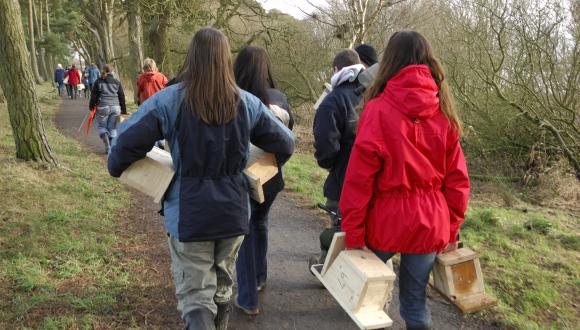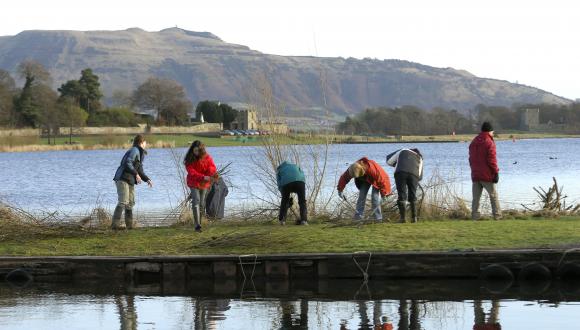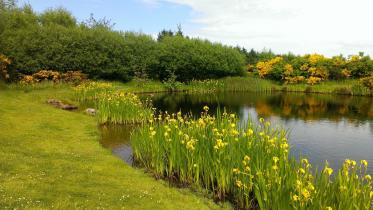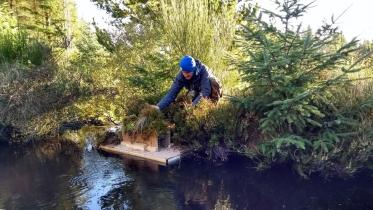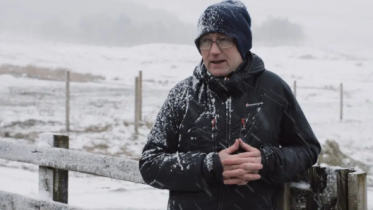NatureScot Volunteers' Handbook
Pages: 12
Published: 2018
Welcome to this handbook for volunteers. NatureScot offers a range of volunteering opportunities suitable for different interests, skills and time availability. On our National Nature Reserves this might include practical work out of doors; research and monitoring of plants and animals; or working with the public, for example helping with a guided walk or providing information in a visitor centre. Opportunities are occasionally available in our network of offices, situated across Scotland, but these are much more limited. Some volunteering opportunities are short-term, such as helping with a half day beach clean or a day of rhododendron removal; others may be longer term offering the chance to contribute a few hours per week over a period of months.
The information provided here is designed to help you find out about volunteering with us, how to apply and what to expect.
We hope that you will consider volunteering with NatureScot, and that if you do your time will be rewarding and productive.
About NatureScot
NatureScot is a non-departmental public body, responsible through Ministers to the Scottish Parliament. We are funded by Government and our Board members are appointed by Scottish Ministers. NatureScot remit comes from the Natural Heritage (Scotland) Act 1991. Our purposes are to promote the care and improvement, responsible enjoyment, greater understanding and appreciation, and sustainable use of the natural heritage, now and for future generations. Scotland’s natural heritage is its wildlife, habitats, landscapes and natural beauty and includes the rocks, soils, landforms and water on which these are based.
Our mission is to promote ‘All of nature for all of Scotland’.
NatureScot works by:
- championing the natural heritage and its contribution to the social and economic well-being of Scotland’s people;
- undertaking research and review to understand the natural heritage and how it can best be managed;
- advising others about how to look after the natural heritage;
- regulating some of the activities that can affect special sites and protected species;
- funding the activities of land managers, communities and voluntary bodies to help people enjoy and enhance the natural heritage; and
- informing and explaining to others about the natural heritage, how it works and how it is changing.
NatureScot employs more than 700 people – a range of people who contribute to and advise on environmental policy, operational people who deliver these policies through working with Scotland’s people and communities, and people who provide the support to help the strategic and day to day functioning of the organisation e.g. Human Resources, Finance, Information Technology, Procurement etc.
The central aim is the same for everyone in NatureScot and that is to deliver our natural heritage objectives. A core feature is that we deliver services at a local level and are responsive to local needs and circumstances; our current structure of 7 Areas places an increased emphasis on local decision-making.
To guide our work, we produce a Corporate Plan and a Business Plan which sets out our key tasks and targets.
Volunteering with NatureScot
NatureScot recognises that volunteers can significantly add value to the work we do for the natural heritage, and that volunteers often benefit by volunteering with us, for example by developing new skills, improving their health, meeting new friends etc.
Here you will find information about how to apply to become a volunteer and some important features of volunteering with NatureScot. Most of our volunteering takes place at our National Nature Reserves (NNRs).
What follows is by no means comprehensive but does cover some very important aspects of volunteering. At the end of this document, you will find a section with some ‘Frequently Asked Questions About Volunteering for NatureScot’.
1. Who can be a volunteer?
Volunteering with NatureScot is open to all. Volunteer placements are made on the basis of the suitability of the volunteer to carry out the particular role and the capacity of NatureScot staff to supervise the volunteer properly.
NatureScot has no upper age limit and recognises the valuable contribution made by older volunteers, in terms of knowledge and experience.
We will consider volunteer placement requests from people under the age of 18. However, to comply fully with health and safety and child protection legislation, many volunteering roles will be unsuitable for this age-group and, unfortunately, we have to decline many more than we can accommodate.
2. How to find out about available volunteer roles
a) Check the Internet
Some of our medium-long term volunteering roles (roles for over 5 days) are advertised on the National Nature Reserve website. We are working to increase the information available. A number of events for volunteers at NNRs are also advertised on our enjoying the outdoors events page for example a beach clean or scrub clearance.
b) Ask locally
Some parts of NatureScot, particularly at the NNRs, keep a list of tasks that a volunteer with the right skills could carry out. These volunteer roles will be filled by suitable volunteers contacting SNH. The contact details for our offices can be found at our contact us page. Some NNRs have their own on-site office, while others are managed from the nearest Area office location.
Alternatively, the contact details for our NNRs can be found by selecting an NNR at the NNR Search by Map then click on ‘More information’ and then on ‘Contact details’.
c) Other ways
Some short-term volunteering practical work days may be pre-arranged with an existing group of volunteers, or by posters being put up on community notice-boards near to an NNR eg a community litter pick, tree planting etc. Some medium - long term volunteer roles may be advertised in other ways, for example if a particular specialised skill is sought eg in the teaching press if teaching skills, or in artistic circles if artistic skills, are sought.
3. How to apply to become a volunteer
Short-term Volunteering (under 5 days duration)
If you are interested in volunteering with NatureScot for the short-term (under 5 days), you need to speak to the relevant member of NatureScot staff at the location you are interested in – see under 2b above for contact details.
The remainder of Part 3 of this Handbook is primarily for medium-long term volunteers ie those who will be with us for over 5 days. Short term volunteers - please go to Part 4 on page 9.
Medium-long term Volunteering Placement (over 5 days duration)
a) Applying for an advertised volunteer role
If you are applying for an advertised medium-long term (over 5 days) volunteer role, the advert will include a description of the volunteering role and application process, which will include submission of a Volunteer Expression of Interest form, with a link to more detailed information - the Volunteer Role Description. This will include information on:
- the skills required;
- equipment or specialist clothing NatureScot will provide;
- the availability of residential accommodation (where relevant);
- if there will be a requirement for a Disclosure check;
- anything that the successful volunteer will need to supply themselves eg warm outdoor clothing.
b) Applying speculatively (ie not for an advertised role)
If you are interested in volunteering with NatureScot for over 5 days, and you have not seen a suitable advertised volunteer role to apply for, you should complete a Volunteer Expression of Interest form, which will help us match the skills, interests and availability of potential volunteers with the roles available. The Volunteer Expression of Interest form is available by emailing [email protected] or on the NatureScot website at our Volunteering with NatureScot page.
We will try to match you to an available Volunteer Role, but if no role is available immediately we will keep your expression of interest for 6 months in case a suitable role becomes available. After 6 months, if no suitable placement has been found, you will need to resubmit to confirm your continued interest (for Data Protection reasons).
When enlisting the help of volunteers, NatureScot will always endeavour to provide as much information as possible to enable prospective volunteers to decide if the role is likely to be suitable for them, but please do feel free to contact the relevant member of staff to discuss any queries you may have.
Please note that submitting a Volunteer Expression of Interest form does not make you a volunteer.
4. Volunteer Placement for Medium - Long Term Volunteers (over 5 days)
The member of staff who will be responsible for the volunteer is called the Volunteer Supervisor. The Volunteer Supervisor is responsible for considering Volunteer Expression of Interest forms and may invite suitable potential volunteers to the office or site for a discussion, informal interview or site visit.
If you are successful with your application you will be provided with a draft Volunteer Placement Agreement (VPA). The VPA will be specific to the particular Volunteer Role and will include things like:
- Details of the placement including role, title, location and name of supervisor
- A start date, days and times of attendance, and length of placement
- Information about what is expected regarding attendance, behaviour standards, timekeeping etc.
5. Induction for Medium - Long Term Volunteers (over 5 days)
On your first day, and over the first few weeks, the Volunteer Supervisor will provide an introduction to your volunteer placement, the location you will be working at, and the staff (and any volunteers) you will be involved with.
So that the induction covers all the items intended, there is an induction checklist which your Volunteer Supervisor will work through with you; health and safety is a particularly important aspect of that.
6. During the Volunteer Placement of Medium - Long Term Volunteers (over 5 days)
For volunteers who will be with us for over 5 days, the points below provide background information on the main aspects of volunteering with NatureScot. Full information will be provided in your Volunteer Placement Agreement.
Personal Protective Equipment
NatureScot will ensure that you have the Personal Protective Equipment (PPE) that you require for your volunteer role, for example waterproof clothing. We may provide it or we may ask you if it possible for you to provide your own.
Expenses
For volunteers who are with us for more than 5 days, we will pay out of pocket expenses. Eligible expenses, all of which need to be approved in advance by your Supervisor and supported by receipts (where applicable), include:
- Travel to/from your place of residence to your volunteering base within an upper daily limit of 50 miles return journey at the current Public Transport Rate (currently 28 pence per mile), or upper limit of £15 for receipted public transport costs. We do not pay travel costs associated with volunteers from overseas travelling to take a volunteer placement, or travel at the start and finish of a volunteer placement where residential accommodation is provided.
- Travel expenses incurred during your volunteer activity – including to any meetings/training courses associated with your volunteer role. Where it is not possible to use public transport you should try to arrange a car share to minimise travel costs and carbon emissions.
Use of NatureScot Vehicles
If you will be using a NatureScot vehicle for carrying out your volunteering duties you will need to complete the NatureScot driver’s questionnaire (available from your Supervisor). Your supervisor will need to see your original driving licence. If your licence is not a clean one, you will not be able to drive NatureScot vehicles until we receive authorisation from our insurance company (which may not be forthcoming in some situations which may mean that a volunteer placement cannot continue). Volunteers are not permitted to use NatureScot vehicles for their own personal use (eg daily travel to/from the volunteer placement) or to give lifts to anyone who is not on NatureScot business.
Use of Your Own Vehicle
If you will be using your own vehicle for carrying out your volunteering duties you must inform your motor insurance company that you are using your vehicle for voluntary work, and ensure that your insurance covers you for this.
Training and development
We are committed to encouraging and supporting volunteer development. During your time volunteering with us you may be able to attend occasional training courses, or undertake another form of training for example job shadowing, studying manuals etc. to help you deliver your role within the organisation.
Reviews
Your supervisor will arrange fairly regular, informal reviews with you to see how things are going, review completed and planned work, update risk assessments, review your training needs etc.
Keeping a Record
If you would like to keep a record of what you have done while volunteering with NatureScot, for example to show prospective employers in support of future job applications, we have a Volunteer Record Form for this purpose. This is kept and updated by you and signed regularly by your supervisor. NatureScot does not provide references for volunteers so this can be a very useful record of your time with us.
Absence
If you are unable to attend your volunteer base for any reason you should notify your supervisor by telephone by 9am on the first day of absence; or earlier if you are due to undertake a task at an earlier time, and others are waiting. You should try to keep your supervisor informed of progress, including giving an indication of when you hope to be available to continue with the placement. This will help your supervisor decide how best to deal with the tasks while you are absent.
Security
You may be required to wear a name badge or other ID which identifies you while volunteering for NatureScot.
Volunteers may be required to have a basic disclosure check carried out prior to commencing the placement. The Volunteer Role Description will state if this is required. NatureScot normally pays for this, provided it represents value for money.
Strict conditions apply to the use of NatureScot Information Systems equipment and your supervisor will advise what is required.
Smoke Free Policy
Smoking is prohibited throughout the entire workplace with no exceptions. This includes NatureScot vehicles and vehicles hired for official use. This applies to all employees, consultants, volunteers, contractors, customers and visitors.
Smoking is only permitted outside, and not if in a location where there is a High Fire Risk (which there often is at some of our National Nature Reserves). Volunteers are asked to smoke only in areas that do not disturb other volunteers, employees and members of the public, and that do not allow smoke to drift back into the building through doors, windows etc.
Conduct
We request a high standard of conduct from our volunteers. We ask you to adopt our core values and standards of acceptable behaviour.
Confidentiality
It is possible that you may come across confidential information whilst volunteering with NatureScot. We request that this is not disclosed to anyone outside NatureScot, either during or after your placement, unless NatureScot has explicitly authorised you to do so.
The exceptions are where, in the course of the placement, it is proper to provide such information or where the volunteer is ordered to do so by a court of law or a tribunal. Volunteers must be very cautious about discussing sensitive issues, and if they are in any doubt, seek advice from your supervisor.
7. At the end of a Volunteer Placement Medium - Long Term Volunteers (over 5 days)
At the end of your Volunteer Placement (the date given on the Volunteer Placement Agreement) you will need to return all NatureScot property to us, including any records obtained or prepared during the placement, any Personal Protective Equipment (PPE), ID etc. supplied or funded by us (with the exception of specific items that cannot be reused by others for hygiene reasons). If applicable, you will also be required to vacate the residential accommodation.
If you wish to leave the volunteer placement early, we request that you clearly let us know your intention. This is to enable us to be sure which volunteer roles are filled and to recruit vacant volunteer roles.
We will ask you to complete an end-of-placement feedback form and general suggestions about the management, organisation and deployment of volunteers are very welcome (as they are at any stage of your Volunteer Placement).
If you wish to have your Placement extended, please discuss this with your Volunteer Supervisor.
Health and Safety
NatureScot is responsible for the health and safety of volunteers – and for others affected by our operations. Volunteers are also responsible for their own health and safety and for those around them; everyone needs to be aware of their health and safety responsibilities. The Volunteer Supervisor will guide you in this and is your first point of contact on all health and safety matters.
Equality and Diversity
NatureScot wholeheartedly supports the principles of equality and diversity – equality of opportunity is not only important in terms of law and social justice, it is also best management practice. We want everyone to make the most of their abilities and to make sure no-one is unfairly treated. We will strive to promote and mainstream equality and diversity in all our activities and functions.
Greening the Workplace
NatureScot aims to make our operations as sustainable as possible by:
- managing all of our resources more sustainably
- reducing our carbon dioxide emissions
- making our corporate processes and programmes more sustainable.
Every volunteer can help to play their part towards NatureScot being a “green” organisation. Each office has a Green Office Plan listing good practice actions volunteers are expected to follow, in order for NatureScot to improve its environmental performance in terms of waste, recycling, energy use, biodiversity, travel and procurement etc. For example, we actively encourage everyone to think “green” and maximise opportunities to car share or cycle. We also have a network of Greening representatives throughout NatureScot to help promote their actions locally.
For more information please contact your volunteer supervisor, your local NatureScot office or [email protected]
The information in this document is current at the time of issue. Your Volunteer Supervisor can provide you with the latest version if required.
Last updated 12 January 2018.
Frequently Asked Questions
If you have any other questions, please let us know and we could include them here.
What would I be doing if I volunteer with NatureScot at a National Nature Reserve?
Volunteers help us with a range of activities. These vary depending on the management requirements of the site, and the time of year, but can include things like
- practical work, perhaps path maintenance, scrub clearance or litter picks
- monitoring of particular habitats and species, perhaps of birds, butterflies or trees
- working with the public, perhaps in a visitor centre or helping to lead groups.
How do I apply to become a volunteer?
Short term Volunteering (Under 5 days)
Check the internet Scotland's National Nature Reserves website or our website , or speak to one of our National Nature Reserve Managers to see if there is a short term volunteering event being organised soon (contact details are on Scotland's National Nature Reserves website under Find an NNR, More information, or, at the NatureScot contact us page).
If you live near a NNR keep an eye on local notice-boards or in the local press for information about events.
Medium-Long Term Volunteering (Over 5 days)
If you are responding to an advertised Volunteer Role, follow the advice given, including completing the Expression of Interest Form and returning it to the address given on the Role.
If you are applying speculatively ie not for an advertised Volunteer Role, complete the Expression of Interest Form and return it to [email protected] We will see if we can match you with an available Volunteer Role. If there is no Role available we will keep the Expression of Interest Form on file for 6 months in case a suitable Role becomes available. (Please note that completing the Expression of Interest Form does not automatically make you a volunteer).
Will I be able to claim expenses?
For volunteers who are with us for more than 5 days, we will pay out of pocket expenses. Eligible expenses, all of which need to be approved in advance by your Supervisor, include:
- Travel to/from your place of residence to your volunteering base within an upper daily limit of 50 miles return journey at the current Public Transport Rate (currently 28 pence per mile), or upper limit of £15 for receipted public transport costs.
- Travel expenses during your volunteer activity – including to any meetings/training courses associated with your volunteer role. Where it is not possible to use public transport you should try to arrange a car share to minimise travel costs and carbon emissions.
I am under 18. Can I be a volunteer?
We will always consider volunteering requests from under 18s but, unfortunately, have to decline many more than we can accommodate, due to health and safety and child protection legislation.
Will I need to bring anything when I am volunteering?
The Volunteer Role Description will state if anything needs to be provided by the volunteer.
How will I get to where I will volunteer?
We will provide information about public transport. Depending on where you are coming from, we may be able to help arrange a car-share. However, for some sites public transport / car sharing will not be possible and you may need your own car to get there.
Do you accept volunteers from overseas?
There are no restrictions on volunteering if you come from the European Union (EU) or the European Economic Area (EEA). If you come from outwith the EU/EEA certain conditions must be met and information is available about these on the Volunteer Development Scotland and Home Office websites.
Can I volunteer if I am claiming Jobseekers Allowance?
You are free to volunteer while you are receiving benefits as long as the work you do is unpaid and you meet the rules of your benefit. Always check with your benefits advisor before you start volunteering. More information is on the direct.gov website.
What happens if I am not sure about applying for a volunteer placement?
The best thing to do is to speak to the Volunteer Supervisor to find out more. There may be another volunteer doing similar tasks that you could speak to. If you are still not sure, you may like to ask the Volunteer Supervisor if you could try the Volunteer Role for a short time to see how you get on, before committing to a Placement of several months.
What happens if I don’t like parts, or any, of the volunteer placement ? eg a particular task is too cold, too lonely, too physically exerting
Raise any concerns you may have with your Supervisor at the earliest opportunity. They will try to address the concerns you have. Keep raising any concerns until you are happy that they have been addressed. Unfortunately, in some cases, it may be that the Volunteer Placement has to end if there is nothing else that can reasonably be done to overcome the problem(s).
How safe is environmental volunteering?
Health and Safety is everyone’s responsibility. You will not be asked to do anything you are uncomfortable with, and your supervisor will ensure that you are competent to carry out the tasks identified for you. A risk assessment will be carried out for every activity you are going to do, and training will be provided if required.
Do you have any questions not detailed here that we should include? Please email them to [email protected]
Document downloads
Contact
Disclaimer: Scottish Natural Heritage (SNH) has changed its name to NatureScot as of the 24th August 2020.
At the time of publishing, this document may still refer to Scottish Natural Heritage (SNH) and include the original branding. It may also contain broken links to the old domain.
If you have any issues accessing this document please contact us via our feedback form.
